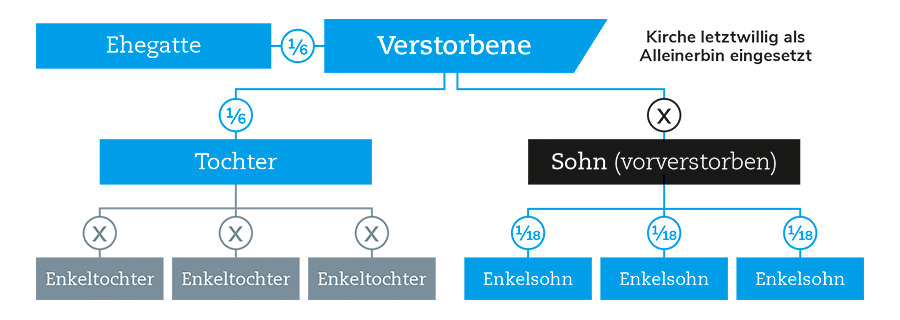 What is a compulsory portion in Austria?
What is a compulsory portion in Austria?
In Austria, every person is free to decide whom to appoint as heir in his or her will. This freedom is limited by the compulsory portion. The compulsory portion is a part of the assets that cannot be freely disposed of.
The right to a compulsory portion thus limits the freedom to dispose of one’s own assets upon death.
It therefore limits the freedom to make a will.
Who is entitled to a compulsory portion in Austria?
Who is entitled to a compulsory portion in Austria?
Question 1: Abstract right to compulsory portion?
 Only the following persons have a right to a compulsory portion:
Only the following persons have a right to a compulsory portion:
- Spouse or registered partner and
- descendants of the deceased, i.e. children, grandchildren, great-grandchildren, etc….
These persons are abstractly entitled to a compulsory portion.
On the other hand, siblings, nephews or nieces, unmarried partners or parents never have a right to a compulsory portion.
Therefore, if a person is not married (“registered partnerships” included) and does not have any children, he or she does not need to be concerned about the right to a compulsory portion. Such a person can freely dispose of all his or her assets. They could, for example, bequeath it in its entirety to the animal welfare association.
Question 2: Concrete right to compulsory portion?
 However, only being entitled to a compulsory portion in the abstract is not sufficient to have a right to a compulsory portion. This is because spouses and descendants are only entitled to a compulsory portion in concrete terms if they would also have inherited something according to the intestate succession. Thus, it must be examined which of the abstract beneficiaries of the compulsory portion would have come into play if the deceased had not made a will.
However, only being entitled to a compulsory portion in the abstract is not sufficient to have a right to a compulsory portion. This is because spouses and descendants are only entitled to a compulsory portion in concrete terms if they would also have inherited something according to the intestate succession. Thus, it must be examined which of the abstract beneficiaries of the compulsory portion would have come into play if the deceased had not made a will.
- Example
If a child of the deceased predeceased, the children of this predeceased child would have been entitled to inheritance according to the legal succession. These grandchildren (in German: “Enkel”) are therefore entitled to a compulsory portion in concrete terms.

If, on the other hand, the predeceased child in this example were still alive, then only this child would be entitled to a compulsory portion in concrete terms, but not the grandchildren.
How large is the compulsory portion in Austria?
How large is the compulsory portion in Austria?
The compulsory portion is exactly half the size of the legal share of the inheritance.
The first step is to calculate the legal share of the inheritance. If there is a will, you think away the will. Then you halve the legal share of the inheritance.
- Example
 The deceased grandmother appointed the Church as her sole heir in her will. She leaves behind a spouse and a living daughter. This daughter in turn has three daughters (three granddaughters). The deceased also had a son. The son died earlier, but he in turn left three sons.
The deceased grandmother appointed the Church as her sole heir in her will. She leaves behind a spouse and a living daughter. This daughter in turn has three daughters (three granddaughters). The deceased also had a son. The son died earlier, but he in turn left three sons.
The spouse, the daughter and the three grandsons are entitled to a compulsory portion in concrete terms, but not the granddaughters. This is because the granddaughters would not be entitled to inherit even according to the intestate succession.
The spouse’s and daughter’s legal share of inheritance is 1/3, half of which is the compulsory share, i.e. 1/6 each.
The compulsory share of the grandsons is 1/18 each, because their legal share of the inheritance is 1/9 each: they share the third allotted to their predeceased father.

Can the deceased determine how one receives one's compulsory portion?
Can the deceased determine how one receives one's compulsory portion?
The deceased can already take the compulsory portion into account in the will. He or she can give certain assets to the beneficiaries of the compulsory portion.
These gifts then cover the compulsory portion. A beneficiary of the compulsory portion cannot defend himself against this. He must take what he gets.
On the other hand, those who have not yet received their compulsory portion have a claim to a cash payment.
When can the deceased withdraw the compulsory portion?
When can the deceased withdraw the compulsory portion?
The deprivation of the compulsory portion is called disinheritance. You can find a separate article on disinheritance with numerous details here.
Such a disinheritance differs from what is commonly understood by “disinheritance”.
This is because “disinheritance” often simply means that someone is excluded from the legal succession. This happens, for example, when a person with children makes a will and names the animal welfare association as sole heir. The children then no longer inherit, but still have their right to a compulsory portion. This “disinheritance” in the non-technical sense is possible at any time for no reason, as this is the freedom to make a will.
Disinheritance in the technical sense in Austria
Disinheritance in the technical sense, i.e. the withdrawal of the compulsory portion, on the other hand, is only possible for certain reasons. There are the following grounds for disinheritance:
- Intentionally committed criminal offence with a penalty of at least one year against the deceased or his or her close relatives,
- deliberate attempt to manipulate the last will and testament of the deceased,
- inflicting severe mental suffering on the deceased in a reprehensible manner,
- gross violation of family law obligations towards the deceased,
- Sentencing to life imprisonment or 20 years imprisonment for a criminal offence,
- The beneficiary of the compulsory portion is wasteful or overindebted and his/her compulsory portion would possibly be lost to his or her descendants. In this case, the compulsory portion can be withdrawn and immediately allocated to the descendants.
- Practical tip
Through an effective disinheritance, the descendants of the disinherited beneficiaries of the compulsory portion receive the compulsory portion. A disinherited child is thus represented by his or her children (the grandchildren of the deceased). Disinheritance therefore does not necessarily mean that the deceased can freely dispose of the corresponding part of the estate.
- Example
The deceased disinherited his son because the latter had seriously injured his mother, the deceased’s spouse, in a dispute. The disinherited son in turn has two children. If there is a will designating another heir, these two grandchildren of the deceased enter into the compulsory portion. Without a testamentary heir, the two grandchildren become legal heirs and receive their father’s share of the inheritance.

When can the compulsory portion at least be reduced?
When can the compulsory portion at least be reduced?
A reduction of the compulsory portion to half is possible in Austria if the deceased and the beneficiary of the compulsory portion did not have a close relationship at least for a longer period of time prior to the death, as usually exists between such family members.
- Example
The son broke off contact with his mother 40 years from her death. Since then, he has sent a Christmas card once a year. Personal contact or telephone calls, on the other hand, no longer took place.
However, this right to a reduction of the compulsory portion is not available if the close relationship is lacking precisely because the deceased prevented contact.
You can find more on this topic here.
When does the claim to the compulsory portion become due? When does it become time-barred?
When does the claim to the compulsory portion become due? When does it become time-barred?
The claim to the compulsory portion becomes due upon the death of the deceased.
However, a beneficiary of the compulsory portion can only claim the entitlement one year later.
A lawsuit can be filed before the end of the year, but the claim does not actually have to be paid until after one year.
- Example
It is already foreseeable that the amount of the right to the compulsory portion will have to be disputed. In this case, the beneficiary of the compulsory portion does not have to wait until a year has elapsed before bringing an action. Rather, she can file suit immediately. If the proceedings take less than one year, the judge must take the one-year period into account in the judgment.
During this year, interest of 4 % accrues. In order to avoid this interest, the heirs may pay out the compulsory portion earlier.
The claim to the compulsory portion must be asserted within three years of knowledge of the relevant circumstances. It becomes time-barred upon the expiry of these three years.
Is it possible to defer the claim to a compulsory portion in Austria?
Is it possible to defer the claim to a compulsory portion in Austria?
The deceased can already stipulate in the will that the compulsory portion is to be paid out in instalments within the five years after his or her death or that it is to be deferred for up to five years.
This protects the testamentary heir from not being immediately sufficiently liquid to pay the compulsory portion claim in full.
However, interest of 4% accrues.
- Example

The deceased had appointed her unmarried partner as her sole heir. Her assets are limited to the last jointly occupied flat, a large condominium of considerable value in a prime location. The partner receives a pension of a medium amount and has no significant assets of his own. The deceased did not include her three children in her will.
In her will, the deceased also stipulated that her partner would not have to pay the compulsory portion until five years after her death. This is because her partner should not be forced to sell or encumber the flat in order to pay the children’s compulsory portion claims.
The partner can nevertheless settle the compulsory portion claims earlier if he wishes to do so. This saves him the interest of 4% per year.
In addition, the heir himself/herself can apply for a deferral if the immediate fulfilment of the claim to the compulsory portion would be unreasonably hard on him/her, taking into account all the circumstances.
This deferral can even extend to ten years. Here, too, interest accrues.
How is the compulsory portion calculated in concrete terms?
How is the compulsory portion calculated in concrete terms?
First, the compulsory portion must be determined (see above).
Then one can determine the absolute amount of the compulsory portion, i.e. the concrete amount of money.
The pure estate as the basis for assessment
First, the value of the “pure estate” must be determined. This is the basis for assessment. The existing assets are to be valued (assets). Liabilities and all costs incurred by the funeral and the probate proceedings are to be deducted (liabilities). The valuation of assets can be very difficult in individual cases (encumbered property, mere rights, intellectual property, etc.).
The gift on death as a liability
Deduction of gifts on account of death
From the pure estate, the compulsory portion is then calculated according to the quota to which the beneficiary is entitled. Everything that was given to the beneficiary of the compulsory portion by reason of death must then be deducted from the result. As already mentioned, no one can choose how they receive their compulsory portion.
- Example
The deceased is survived by her spouse and her son Franz. In her will she named her spouse as sole heir, but left her Steinway grand piano worth € 100,000.00 to her child. The total value of the estate is € 600,000.00. Franz has always hated playing the piano. His compulsory share is 1/3, because his legal share of the inheritance would be 2/3 in addition to the spouse of the deceased. This corresponds to € 200,000.00. However, since Franz was bequeathed the Steinway grand piano, he can only claim € 100,000.00 from the spouse of the deceased. The fact that he never wanted the Steinway piano does not change this.
Can one give away one’s assets before death so that unloved descendants no longer have a compulsory share?
In many cases, this will not work. This is because certain gifts are subject to so-called additions and imputations on the compulsory portion. Which gifts are involved, i.e. which gifts are subject to imputing, is answered in the next section.
Gifts that do not have to be imputed are not taken into account, i.e. they actually reduce the compulsory portion definitively.
You can find details on the imputation of gifts in Austrian inheritance law in our article on gifts.
Which gifts are subject to imputation?
Which gifts are subject to imputation?
Gifts to abstract beneficiaries of the compulsory portion are to be credited for an unlimited period in Austria.
- Example
A deceased woman gave a property to (only) one of her three children during her lifetime. By the time of her death, 37 years had passed.
This gift is to be added to and imputed in the assessment of the compulsory portions. This is because the recipient of the gift, as the son of the deceased, is entitled to a compulsory portion.
On the other hand, in Austria, gifts to persons not entitled to a compulsory portion are only to be credited if they were made within two years prior to the death of the deceased.
- Example
The deceased gave her car to her carer 3 years before her death. This gift is not added or credited. It remains out of consideration and has thus reduced the compulsory portion of the deceased’s descendants.
- Practical tip
A gift on death is always considered to have been made at the time of death. Therefore, it must always be taken into account in the course of addition and imputation, even if the recipient is not entitled to a compulsory portion and the contract was concluded more than two years ago.
Exception of gifts from crediting against the compulsory portion
Gifts are excluded from the addition and crediting
- without diminution of the original assets,
- for charitable purposes,
- in accordance with a moral duty,
- for reasons of decency.
- Practical tip
Whether such an exception actually exists must be carefully examined in each individual case, taking into account the case law. There are partly clear guidelines by the courts here, even if these four exceptions may sound quite far-reaching, at least from the wording.
Isn't this unequal treatment unfair?
Isn't this unequal treatment unfair?
“I can make a gift to my neighbour that reduces my compulsory portion, but not to my own child?”
One reason for this unequal treatment of gifts lies in a presumption of the legislator. This presumption is as follows:
- Anyone who sets the frowned-upon goal of reducing the compulsory portion (for example, in order to “get one over on the children”) will as a rule make a gift of his or her assets to another person entitled to the compulsory portion. With gifts to beneficiaries of the compulsory portion, the giver of the gift has thus possibly pursued frowned-upon goals. Hence the unlimited addition and imputation.
- On the other hand, anyone who gives a gift to a neighbour or a carer does not do so – so the legislator believes – because they want to reduce the compulsory portion. Rather, as a rule, the gift is in the foreground.
Of course, this assumption is not always correct. Legally, however, it does not matter.
How exactly does the addition and imputation work?
How exactly does the addition and imputation work?
First of all, please refer again to our article on gifts, where you will find more details on gift imputation.
Here are the main features:
First of all, all gifts subject to imputation that the deceased made during his or her lifetime are added to the pure estate. This is the “addition of gifts”.
- Practical tip
You are wondering how you, as the beneficiary of the compulsory portion, can even know which assets the deceased gave away to whom during her lifetime?
The law has taken precautions here: Anyone who can demand the addition of certain gifts has a claim to information regarding these gifts against the estate, the heirs and the gift recipient.
Increased assessment basis for the compulsory portion in Austria
The result of the addition of the gifts is a new basis of assessment for the compulsory portion. This consists of the pure estate and the added gifts. The addition therefore increases the assessment basis for the assessment of the compulsory portions.
From this new basis of assessment, the compulsory portions are now calculated on the basis of the determined compulsory portion quotas.
And from the compulsory portions calculated in this way, the imputable gifts that the respective beneficiary of the compulsory portion has received himself/herself are then deducted. This is the “crediting of own gifts”. The imputation thus reduces individual compulsory portions by gifts already received.
- Example
 The deceased gave his car worth € 30,000 to his carer shortly before his death. He also gave his son Anton a savings book worth € 20,000 twenty years ago. The pure estate amounts to € 100,000. In addition to Anton, the deceased left two other sons, and he appointed his unmarried partner as his sole heir.
The deceased gave his car worth € 30,000 to his carer shortly before his death. He also gave his son Anton a savings book worth € 20,000 twenty years ago. The pure estate amounts to € 100,000. In addition to Anton, the deceased left two other sons, and he appointed his unmarried partner as his sole heir.
The assessment basis for the assessment of the compulsory portions after the addition of the gifts subject to imputation amounts to € 150,000 (= € 100,000 pure estate + € 30,000 value of the car + € 20,000 value of the savings book). The compulsory portion of the sons is 1/6 each, which results in € 25,000.00 each. However, Anton has to take into account the gift of the savings book worth € 20,000, so he only receives € 5,000. His brothers, on the other hand, each receive the full € 25,000.
Without addition and crediting, all sons would have received € 16,666.67 (= 1/6 of the pure estate of € 100,000). The addition and crediting of the gift to the carer and the resulting increase in the compulsory portions of the two other sons are at the expense of the sole heir, i.e. they reduce the inheritance of the partner. In the end, she only receives € 45,000 (= € 100,000 – € 5,000 – € 25,000 – € 25,000) instead of € 50,000 (without imputation).

- Practical tip
You are wondering when a gift recipient must return his or her gift so that a person entitled to a compulsory portion can receive his or her full compulsory portion in Austria? You can find the answer to this question in our article on gifts in Austrian inheritance law.
Addition and imputation on the compulsory portion - How are gifts to be valued in Austria?
Addition and imputation on the compulsory portion - How are gifts to be valued in Austria?
Especially in the case of real estate, there is often a considerable increase in value between the gift and the death of the donor. But to what value should the gift of real estate then be added and credited?
The decisive factor is the value at the time of the gift. This value is then valorised according to the consumer price index (click here for the index calculator of Statistics Austria). Inflation should thus not be at the expense of the (other) beneficiaries of the compulsory portion.
On the other hand, increases in value are meaningless. Only the donee benefits from the increase in value, not the (other) beneficiaries of the compulsory portion.
What is a waiver of the compulsory portion?
What is a waiver of the compulsory portion?
In Austria, the beneficiaries of the compulsory portion can also waive their compulsory portion.
Those who want to be able to freely dispose of as large a part of the assets upon death as possible try to persuade the beneficiaries of the compulsory portion to waive their compulsory portion.
- Example
The parents want to financially support their daughter, who wants to build a house for her family. In return, the daughter is to waive her compulsory portion. In this way, the parents ensure that their son can inherit the parental house after their death without having to pay a compulsory share to his sister.
Does an illegitimate child receive a compulsory share?
Does an illegitimate child receive a compulsory share?
Of course, an illegitimate child also has a right to a compulsory portion in Austria.
Whether a child is legitimate or illegitimate is irrelevant in Austrian inheritance law.

Does the standard value also play a role in the calculation of the compulsory portion?
Does the standard value also play a role in the calculation of the compulsory portion?
No, it always depends on the market value of real estate assets. The standard value (in German: “Einheitswert”) does not matter.
Any more questions on Austrian inheritance law?
Inheritance law is our passion. We are your inheritance lawyer for Austria.
We listen and tell you whether we can assist or not. You will not be surprised by any unexpected costs, we will inform you of any costs incurred in good time.
Was this helpful?
Cover picture by PublicDomainPictures on Pixabay
Symbol image 1 (barbed wird) by analogicus on Pixabay
Symbol image 2 (couple) by lecreusois on Pixabay
Symbol image 3 (father and son) by StockSnap on Pixabay
Symbol image 4 (church on island) by David Mark on Pixabay
Symbol image 5 (facade) by LEEROY Agency on Pixabay
Symbol image 6 (vehicle) by Pexels on Pixabay
Symbol image 7 (child) by Free-Photos on Pixabay
Symbol image